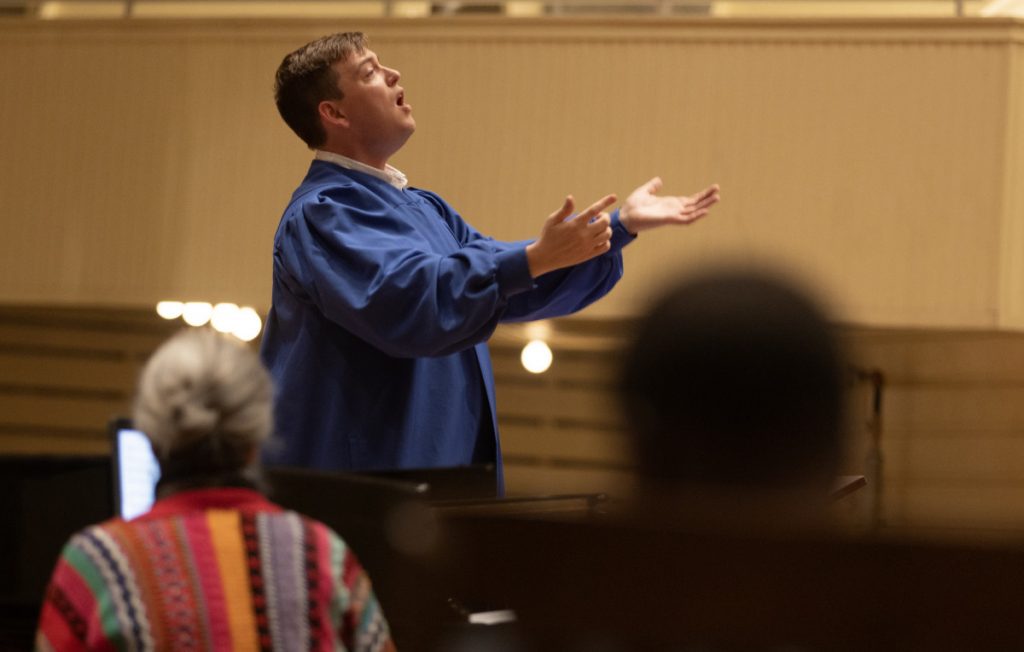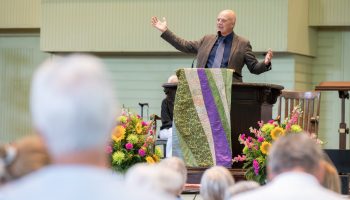
Joshua Stafford, director of sacred music and Jared Jacobsen Chair for the Organist, conducts the choir during the Sacred Song service at 8:00 PM on Jun. 30, 2024, in the Amphitheater.
For 130 years, worship at Chautauqua was a mix of preaching the gospel of Jesus Christ, theological reflection, and music to lift the soul. On Aug. 1, 2004, Chautauqua celebrated a historic milestone: For the first time Communion — the Lord’s Supper — was celebrated during the 10:45 a.m. Sunday morning worship service.
At 8 p.m. Sunday for the first time since the pandemic and for the first time during a Sacred Song Service, the Department of Religion is planning an ecumenical Communion service. The title for the service is “Forgive as We are Forgiven: Ecumenical Communion.”
The Rt. Rev. Eugene Taylor Sutton, senior pastor at Chautauqua, and Joshua Stafford, director of sacred music and the Jared Jacobsen Chair for the Organist, felt it was time to renew the custom.
“The last time we celebrated Communion was in 2019,” Sutton said. “We decided that the 150th anniversary was a good time to re-establish the custom.”
“We decided to do it at Sacred Song since it is a more intimate service than morning worship,” Stafford added.
Planning for the service has meant looking for some of the treasures used for Communion from 2004 to 2019. These treasures include Bishop John Heyl Vincent’s chalice; chalices made by students and faculty at the School of Art in 2004 for the first Eucharist in the Amp; and wooden bowls for the bread carved from trees at Chautauqua.
The bread will be made by members of the Chautauqua Choir and the grape juice is supplied by a grape growers co-operative in Westfield. There will be a station with gluten-free bread. Planning also meant looking for people to help set up for the service, for people to serve the Communion and people to help clear after the service.
In 2004, the Rev. Joan Brown Campbell, with her deep ties to the ecumenical movement in the 20th century and into the 21st, thought it was time for Chautauquans to celebrate Communion in an ecumenical service, not just in separate denominational houses.
“Recent years have seen ecumenical breakthroughs, agreements of full Communion resolution on key church-dividing issues and a willingness to live toward full Communion as expressed in the World Council of Church’s critical document Baptism, Eucharist and Ministry (1983),” she wrote for the Daily in advance of the history-making service.
The Consultation on Church Union, begun in 1962 through the efforts of the United Presbyterian Church in the USA and the Episcopal Church, and its descendant, Churches of Christ Uniting, provided the atmosphere for congregations to take the World Council document to heart.
“Any sign of Christian unity, done with the grace of God in a broken world, is a sign for Christians, for Jews, for Muslims. Any sign that is meant to include people means that the broken can be healed,” Campbell said in 2014. “I have had Communion all over the world, and rarely in grand cathedrals. Most of the time, it was in houses and in places where people’s lives were in danger, but the spirit was very much there. Even in China, we were able to share the bread and wine.”




